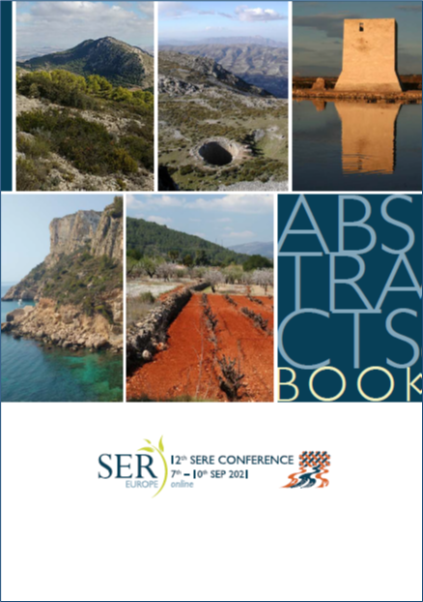SERE2021 Conference
Abstracts of all sessions held during
the 12th SER-Europe Conference
7th – 10th September 2021
Online / University of Alicante
Link to follow
Outcome from SER2014
Two special issues from the SER2014 Conference were completed.
Karel Prach and Anne Tolvanen put together the one entitled ‘ How can we restore biodiversity and ecosystem services in mining and industrial sites?’ for Environment Science and Pollution Research volume 23 number 14, containing 16 articles, and Anne Tolvanen and James Aronson coordinated ‘Ecological Restoration, ecosystem services and land use’ for Ecology and Society 21, containing 12 articles.
Guidelines for Native Seed Production and Grassland Restoration
The degradation of natural and semi-natural ecosystems is increasing, and commercial seed mixtures with non-native species are often used in grassland restoration, harming biodiversity. This book compiles findings from a Special Session on “Native Seed Production and Use in Restoration Projects” held at the 8th European Conference on Ecological Restoration. It reviews ecological and genetic aspects of seed propagation and species introduction from both European and American perspectives, discussing seed zones and native seed production. The book provides best practices and guidelines for implementing successful restoration projects using native seeds for grasslands, field margins, and sagebrush steppe.
For full content of the book click ‘view extract’ on the following link.
Special Journal Issue
Applied Vegetation Science
The special issue of the journal emerged from the 8th European Conference on Ecological Restoration held 9-14 September 2012 in České Budějovice (Budweis), Czech Republic.
The special issue is devoted to one of many topics of the conference: Vegetation Dynamics in Ecological Restoration.
The cover photo illustrates how spontaneous succession can be effective in restoration of coal mining spoil heaps (this one is 20 years old).
Find the article here
Ecological Restoration
in the Czech Republic
The Czech Republic once featured a fine-scale mosaic of natural, semi-natural, and anthropogenic ecosystems, but this was severely disrupted during the latter half of the 20th century under the communist regime, leading to widespread degradation.
This publication, presented at the 8th European Conference of Ecological Restoration, discusses ecological restoration possibilities and presents case studies on woodlands, grasslands, wetlands, mining sites, military training areas, and landscapes.
It provides a well-illustrated overview of ecological restoration efforts in the Czech Republic, showcasing various restoration approaches across diverse ecosystems.
Download this book as pdf here
Ecological Restoration
in the Czech Republic
Flanders, one of the most densely populated regions, faces significant pressure on its natural environment. Ecological restoration has become a key focus in Flemish nature conservation over the past two decades.
This illustrated book, presented at the 6th European Conference on Ecological Restoration, discusses 40 restoration projects, highlighting both successes and challenges.
Key points for successful future restoration include creating win-win projects with other land uses, scientifically defining ecological constraints and objectives, implementing effective communication strategies to gain public support, and prioritizing post-restoration monitoring to enhance knowledge and ensure necessary adjustments.







